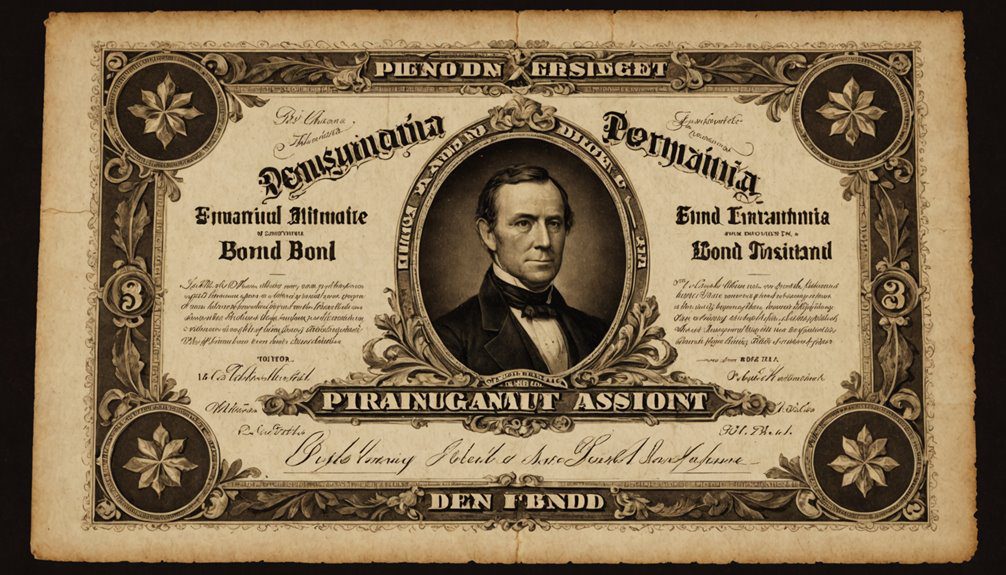If you're a trading assistant in Pennsylvania, you might want to consider the implications of the Trading Assistant Bond. This bond isn't just a regulatory requirement; it serves as a vital tool for building trust with your clients and ensuring compliance with state laws. Understanding its importance and the steps involved in securing it can significantly impact your career. But what exactly does the application process entail, and what happens if you fail to comply? The answers could shape your professional landscape in more ways than you think.
What Is a Trading Assistant Bond?

A Trading Assistant Bond is a type of surety bond that ensures compliance with licensing and regulatory requirements for trading assistants in Pennsylvania. This bond serves as a financial guarantee, protecting clients and the state from any potential misconduct or violations by trading assistants.
If you're working as a trading assistant, obtaining this bond is a crucial step in your professional journey.
When you secure a Trading Assistant Bond, you're essentially promising to adhere to the laws and regulations set forth by the state. This bond reflects your commitment to ethical practices and professionalism in the trading field.
It also reassures clients and employers that you'll conduct your activities in line with the established legal framework. Additionally, having this bond can enhance your credibility and trustworthiness in the surety bond industry.
You'll typically need to apply for this bond through a surety company, which will assess your financial stability, creditworthiness, and experience in the trading industry.
The bond amount may vary based on state requirements and your specific role.
Importance of the Bond
Obtaining a Trading Assistant Bond is more than just a regulatory formality; it plays a vital role in your professional reputation. When you secure this bond, you demonstrate your commitment to ethical practices and compliance with state regulations. This not only builds trust with clients but also sets you apart in a competitive market.
Having this bond can protect you against potential financial losses resulting from your actions as a trading assistant. If a client experiences damages due to your negligence or misconduct, the bond provides a financial safety net, ensuring clients can seek restitution. This level of accountability can significantly enhance your credibility and lead to stronger business relationships.
Additionally, many clients may require proof of your bond before engaging your services. By having this assurance in place, you'll find it easier to attract clients who value security and professionalism. Furthermore, similar to debt consolidator bonds, the Trading Assistant Bond serves as a safeguard for consumers against unethical practices within the industry.
Ultimately, the Trading Assistant Bond is an essential tool that safeguards your career and boosts your standing in the industry. Investing the time and resources into obtaining this bond can pay off in the long run, establishing you as a trustworthy and reliable trading assistant.
Who Needs the Bond?

Trading assistants in Pennsylvania need the bond to operate legally and maintain their professional integrity. If you're a trading assistant, this bond is essential for your practice. It not only ensures that you adhere to state regulations but also protects your clients and the public from potential misconduct.
You must secure this bond if you provide services like investment advice, trading, or managing portfolios. The bond acts as a financial safety net, guaranteeing compensation for clients in case of any fraudulent activities or negligence on your part. Without it, you risk facing legal repercussions and losing clients' trust.
Even if you're just starting in the trading field, obtaining this bond should be one of your top priorities. It signals your commitment to ethical trading practices and professionalism. Moreover, having the bond can enhance your credibility, making you more appealing to potential clients. Additionally, the bond serves to protect clients from fraudulent activities, ensuring a higher level of trust in your services.
Bond Application Process
Securing your Pennsylvania trading assistant bond involves a straightforward application process that you'll need to navigate efficiently.
First, you'll want to gather all necessary documentation, including your business information and proof of your financial stability. This step is crucial, as it demonstrates your ability to uphold the responsibilities tied to the bond.
Next, you'll need to fill out an application form. This form typically requires details about your business and your professional background. Be sure to provide accurate information, as any discrepancies could delay the process or lead to rejection.
Once you've completed the application, submit it along with any required documents to the bonding company or agent you choose. They may conduct a background check and assess your financial history to determine your eligibility for the bond. Be prepared for this step, as it helps them gauge the risk involved in issuing the bond.
After your application is reviewed, you'll receive a decision. If approved, you'll receive your bond, enabling you to operate as a trading assistant in Pennsylvania.
Costs and Fees Involved

When considering your Pennsylvania trading assistant bond, it's essential to understand the costs and fees involved. The primary cost you'll face is the premium for the bond itself. This premium typically ranges from 1% to 15% of the bond amount, depending on factors like your credit score and the bond's total value.
If your credit is strong, you can expect a lower premium, while a lower score might lead to higher costs.
Additionally, you should be aware of any application fees charged by the bonding company. These fees can vary significantly, so it's wise to shop around for the best deal. Some companies may also impose processing fees for paperwork or other administrative tasks.
Don't forget about renewal costs, as bonds usually have to be renewed annually. Each renewal may come with its own set of costs, which could change based on your financial situation or changes in the bond market. Furthermore, be mindful of the local government requirements that may influence the specific bond costs you encounter.
Compliance and Regulations
In the realm of Pennsylvania trading assistant bonds, compliance with state regulations is crucial for maintaining your business's credibility and legality. You need to familiarize yourself with the Pennsylvania Securities Commission's requirements and ensure that your trading practices align with their guidelines. This means obtaining the necessary licensing and keeping up with any changes in legislation that could affect your operations.
Additionally, you must adhere to the rules set forth in the Pennsylvania Uniform Securities Act. This act outlines the responsibilities of trading assistants, including the need for accurate record-keeping and transparent communication with clients. Staying informed about these regulations won't only help you avoid potential pitfalls but also enhance your reputation in the industry.
Regularly reviewing your compliance measures is essential. You should conduct internal audits and training sessions to ensure that all staff members understand their obligations under the law. By proactively addressing compliance, you can build trust with your clients and position your business for long-term success.
Consequences of Non-Compliance

Failing to comply with Pennsylvania's trading assistant regulations can lead to serious repercussions for your business. You risk facing hefty fines that can significantly impact your bottom line. Regulatory bodies take violations seriously, and they won't hesitate to impose penalties that could jeopardize your operations.
Additionally, your business's reputation can suffer immensely. Clients and partners may lose trust in your ability to operate ethically and legally, potentially resulting in lost contracts and future opportunities.
If your business gets flagged for non-compliance, it could also attract unwanted scrutiny from regulators, leading to further audits and investigations.
In extreme cases, you might face the suspension or revocation of your trading assistant license. This not only halts your business activities but can also create a ripple effect, causing financial strain and loss of clientele.
It's crucial to stay informed about the regulations and ensure you're in compliance at all times. By doing so, you protect your business from these severe consequences and build a foundation for long-term success in the trading industry.
Don't underestimate the importance of adhering to the rules; the risks are simply too great.
Benefits for Traders and Clients
Through compliance with Pennsylvania's trading assistant regulations, traders and clients alike can enjoy numerous benefits that enhance their trading experience. By adhering to these regulations, you gain a layer of trust, knowing that your trading assistant is bonded and accountable. This bond acts as a safety net, providing financial security for your transactions and ensuring that you're protected against potential losses due to misconduct.
For traders, maintaining compliance fosters a professional environment that attracts clients. It signals your commitment to ethical practices, boosting your reputation in the marketplace. This credibility can lead to increased client retention and new business opportunities.
Clients benefit as well; they can trade with confidence, knowing they're working with a regulated professional. This assurance often leads to better communication and a more collaborative trading relationship.
Furthermore, compliant trading assistants are more likely to stay informed about market trends and legal obligations, ultimately providing clients with valuable insights and guidance. Additionally, having a bond demonstrates your commitment to ethical conduct, further reinforcing the trust clients place in your services.
How to Maintain the Bond

Maintaining your trading assistant bond requires ongoing commitment to compliance and ethical practices. First, stay informed about the latest regulations and industry standards. Regularly review state laws and guidelines to ensure your operations align with them. This diligence not only helps you avoid penalties but also builds trust with clients.
Next, keep accurate records of all transactions and communications. Documenting your activities safeguards you in case of disputes and demonstrates your adherence to ethical standards. It's also essential to provide transparency to clients, so they feel secure in your services.
Engage in continuous education and training. Attend workshops, conferences, or courses related to trading practices to sharpen your skills and knowledge. This investment in your professional development shows your commitment to the field.
Additionally, consider forming a network with other trading assistants. Sharing experiences and best practices can provide valuable insights and keep you accountable.
Lastly, regularly assess your business practices. Identify areas for improvement and make necessary adjustments. By staying proactive, you not only maintain your bond but also enhance your reputation as a trustworthy trading assistant.
Conclusion
Securing a Pennsylvania Trading Assistant Bond is essential for your success as a trading professional. Not only does it protect your clients and enhance your credibility, but it also keeps you compliant with state regulations. By committing to this bond, you demonstrate integrity and professionalism, building trust within the investment community. Remember, maintaining the bond is key to reaping its benefits, so stay informed and proactive in your compliance efforts for lasting success.


